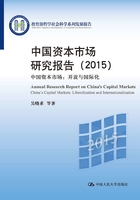
Key Point
China is a great power and the Chinese economy is an economic power, therefore, China must build a financial power to match the major economy.The financial power, which China requires not only calls for efficient and powerful resource allocation capability, but also needs a good risk diversification mechanism. Moreover, the financial power must be opened and internationalized. There are at least three basic elements for the establishment of the financial power:first, a developed, transparent and opened financial market with good liquidity, especially a capital market with wealth management function; second, financial intermediaries or financial institutions with a global vision and market-oriented innovation capabilities, which can effectively meet the diverse financial needs of customers; third, the RMB with international influence, global free flowing capability and wealth reserve capacity.In these three structural elements, the wealth management function plays the most crucial and fundamental role.
As the cornerstone of the financial power, the strategic objective of the Chinese capital markets' future must be the development of an international financial center.The international financial center, which China seeking for is not(or not primarily)a currency trading and clearing center, nor a currency pricing center;rather, it is a wealth management and trading center with RMB-dominated assets. Indications show that China has becoming a new world financial center, a new growth pole of global finance.Based on the strategic objective, expanding liberalization and promoting internationalization have become the focus of the Chinese capital markets' future reform and policy adjustment.
In the Chinese capital market liberalization and internationalization process, the following problems are unavoidable and must be resolved:the strategic objective and the functional orientation of the market's future development; alternative paths and the corresponding prerequisites for the market liberalization and internationalization; how to improve the legal system and market rules; how to adjust the listing policy to revitalize market assets; how to increase the investment proportion of international(foreign)investors; how to upgrade the international competitiveness and market influence of Chinese investment banks(securities firms); how to evaluate the market risk in the process of liberalization and internationalization; how to strengthen the regulatory cooperation of international securities markets; what kind of competitions will be brought into the geopolitics and global financial centers with the development and internationalization of the Chinese capital markets; and how to strengthen the coordination and cooperation with other markets.All the issues related to the liberalization and internationalization of China's capital markets are involved in this study.Also, the author puts forward theoretical explanations and policy recommendations in it.